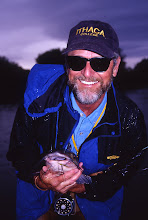Northern pike in Washington? Yep, they are here and their numbers are exploding. Some goofball transplanted them into Newman Lake, but that's not the real concern. They have established themselves as the top predator in the Pend Oreille River.
At yesterday's Inland Fish Policy Advisory Group meeting in Ephrata, Bruce Bolding of WDFW outlined the facts. In summary, northern pike, flushed out of the Clark Fork through the Lake Pend Oreille and over Albeni Falls Dam, have found the Box Canyon portion of the Pend Oreille River to be a lovely home. To get some sense of the numbers, in 2004 there were roughly 400 adult pike in the river. In 2009, that number mushroomed to 7500. At the same time, the numbers of the resident fish populations, (save one) have shown marked decreases.
Initially the biologists thought the fish were confined to the southern half of Box Canyon. Not so as the fish have moved downstream into Boundary Pool as well. In a recent bass tournament on Boundary Pool, every angler caught pike.
So what's the problem you might say? Impact on native fish and salmonids in particular. Over the next number of years, roughly $500 million will be spent improving fish passage over Boundary, Box Canyon and Albeni Falls dams and restoring native cutthroat and bull trout populations. A future concern is further spread downstream into the Columbia River and the potential havoc to be wreaked on salmon and steelhead populations.
These fish present a terrific catch and keep fishing opportunity as there is no limit and no minimize size. Forget the catch and release ethic (this coming from the guy who released all but one pink salmon last year), every one says pike fillets are quite tasty
Sunday, August 22, 2010
Wednesday, August 18, 2010
Logging Roads and Salmon Recovery
9th Circuit Court of Appeals has ruled that logging road sediment is point source pollution when it enters a stream. That calls into play the Clean Water Act with the requirement that permits must be obtained from EPA under the National Pollution Discharge Elimination System.
That is a whole mouthful, but what it means is logging road construction will have to change. The current construction standards that allow egg-suffocating sediment to flow into streams and rivers will have to change, at least in the states covered by the 9th Circuit.
Expect the decision to be appealed and expect the timber industry to lobby for legistative exemption from the Clean Water Act.
All those interested in salmon, steelhead and resident trout recovery should take steps to educate their federal legislators on the wisdom of resisting easing road construction standards.
If you'd like to read the opinion, cut and past this url. http://www.ca9.uscourts.gov/datastore/opinions/2010/08/17/07-35266.pdf
That is a whole mouthful, but what it means is logging road construction will have to change. The current construction standards that allow egg-suffocating sediment to flow into streams and rivers will have to change, at least in the states covered by the 9th Circuit.
Expect the decision to be appealed and expect the timber industry to lobby for legistative exemption from the Clean Water Act.
All those interested in salmon, steelhead and resident trout recovery should take steps to educate their federal legislators on the wisdom of resisting easing road construction standards.
If you'd like to read the opinion, cut and past this url. http://www.ca9.uscourts.gov/datastore/opinions/2010/08/17/07-35266.pdf
Subscribe to:
Posts (Atom)
